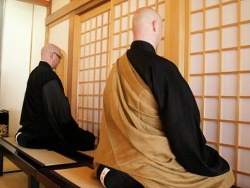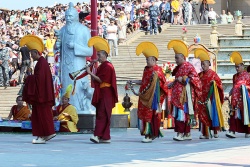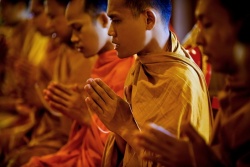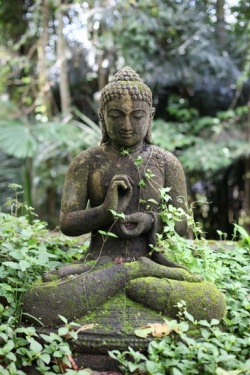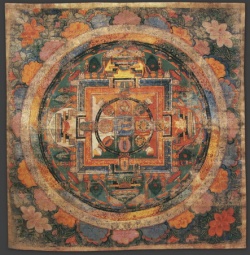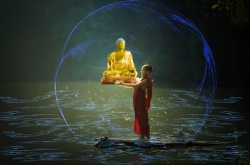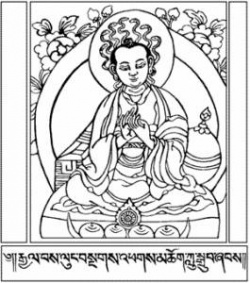No real practitioners reject existence of rebirth
This topic is probably more appropriate for western materialists. I think Asians accept rebirth easier.
Nowadays Buddhist-inspired meditation and mindfulness seems to be accepted by non-Buddhists, after stripping out the 'religious' parts. It's good that it helps people in their lives. But it's like there's also a trend for atheistic/secular Buddhism where people follow the philosophy, but don't subscribe to the beliefs in karma and rebirth and other 'religious' parts. Some people like to say Buddhism is philosophy by the historical Buddha and it is people who made it into a religion.
What's your take on it?
This is a good question.
Those who strip out rebirth and karma are stripping out the basis for practicing for liberation. That is, they only experience the meagre benefits of calm abiding in their meditation, but they will never experience the benefits that the wisdom of dharma has to offer which leads towards the liberation from afflictions (passion, aggression and delusion) - the causes of samsara and rebirth. All they want will be some inner peace, but they will never get to the true import and goal of Buddhadharma which is Nirvana.
Since all they have is one life (a.k.a. 'YOLO'), there is no need to care about future life at all, other than to just enjoy one's life in a hedonistic way. Meditation is merely just a means for them to experience some relaxation.
When my spiritual mentor, lets just call him X because he likes anonymity, recalled numberless past lives and faces in his meditation samadhi one day long long time ago, he got sick of it and realized the necessity to be liberated. He also got the sense that this life is really not very important at all (other than to practice, that is), what used to be very important turns out to be quite meaningless.
Got another time long long time ago, King Yama (lord of the death, a.k.a 阎罗王) and another spirit were speaking to each other when he was meditating - and both of them were saying that he has not overcome death. He did not even know who 'yama' was at that time, but he heard a voice addressing Yama and Yama said oh, so that was the one who has not yet overcome death. When he came out of meditation he went to find out what 'yama' is. Why did yama appear in his meditation? I do not know, maybe to serve as a reminder. He was already quite experienced and had certain realization at that time, but it is always good to remind ourselves that the path is long ahead and not get carried away.
If we are real practitioners of Buddhadharma who accept rebirth and karma, we must not kid ourselves, death is our real test. Until we have perfected our practice and attained complete liberation, we must never be satisfied with some results in practice, we must never satisfied with our realization, much less what those atheist get out of meditation (some minor relaxation or peace, which is meagre). On the other hand if there is no rebirth, then everyone will achieve 'Nirvana' at death without practice so one can just relax and take things easy and just enjoy life as it is, therefore such a view is fundamentally at odds with the Buddhadharma and is totally not appropriate for real practitioners. Thinking about death and rebirth everyday will instill a sense of urgency and necessity for practice which will never come if we reject rebirth.
"Life is like a passing cloud, when it comes to an end, a hundred years is like yesterday, like a snap of a finger. If it is only about one life, it really doesnt matter whether we are enlightened. The insight that the Blessed One has is not just about one life; countless lives we suffered, life after life, unending. Such is suffering.
It is not about logic or science and there is really no point arguing in this scientific age. Take steps in practice and experience the truth of Buddhas words. Of the 3 dharma seals, the truth of suffering to me is most difficult to experience in depth.
May all take Buddhas words seriously."
Those that hold the wrong view that there is no rebirth, are opponents to the arahants who have recalled their past lives and declared the existence of rebirth. Holders of wrong view cannot be expected to attain the goal, since right view is the forerunner of the noble eightfold path which leads to Nirvana.
Buddha:
"Because there actually is the next world, the view of one who thinks, 'There is no next world' is his wrong view. Because there actually is the next world, when he is resolved that 'There is no next world,' that is his wrong resolve. Because there actually is the next world, when he speaks the statement, 'There is no next world,' that is his wrong speech. Because there actually is the next world, when he is says that 'There is no next world,' he makes himself an opponent to those arahants who know the next world. Because there actually is the next world, when he persuades another that 'There is no next world,' that is persuasion in what is not true Dhamma. And in that persuasion in what is not true Dhamma, he exalts himself and disparages others. Whatever good habituation he previously had is abandoned, while bad habituation is manifested. And this wrong view, wrong resolve, wrong speech, opposition to the arahants, persuasion in what is not true Dhamma, exaltation of self, & disparagement of others: These many evil, unskillful activities come into play, in dependence on wrong view."
Those who strip out rebirth and karma are stripping out the basis for practicing for liberation. That is, they only experience the meagre benefits of calm abiding in their meditation, but they will never experience the benefits that the wisdom of dharma has to offer which leads towards the liberation from afflictions (passion, aggression and delusion) - the causes of samsara and rebirth. All they want will be some inner peace, but they will never get to the true import and goal of Buddhadharma which is Nirvana.
The teaching of rebirth and karma are to encourage individuals to practice good morality, ethical behaviors and the act of giving; one of the three paths of purification from the Theravada point of view. To say that if one does not believe in rebirth one will never experience the benefits of the wisdom of dharma is an overstatement. Many practitioners in this region go to temples and practices dana to accumulate merits for a better present life and also hopefully a better future rebirth. When the practice of giving are carried out with such intention it defeats the purpose of the third noble truth which is the ending of suffering and the cessation of further rebirth. This is not to say that there are no practitioners who do not do dana on selfless ground. The practice of meditation is to purify one’s mind for calm abiding so that wisdom can arise. To say that such experience is of meagre benefit is an understatement in itself.
Since all they have is one life (a.k.a. 'YOLO'), there is no need to care about future life at all, other than to just enjoy one's life in a hedonistic way. Meditation is merely just a means for them to experience some relaxation.
It is not necessary that all who believe in a one life existence act and behave the way it is stated above. There are secular Buddhists who believe in the practice of the here and now, believe in the four noble truths, the dependent origination doctrine and live life by the eightfold noble path. Who is to judge that such people will not realized the cessation of suffering?
On the other hand if there is no rebirth, then everyone will achieve 'Nirvana' at death without practice so one can just relax and take things easy and just enjoy life as it is, therefore such a view is fundamentally at odds with the Buddhadharma and is totally not appropriate for real practitioners.
That is not a Buddhist view at all. One should be more specific and not be making such sweeping conclusion here. It can be confusing.
Thinking about death and rebirth everyday will instill a sense of urgency and necessity for practice which will never come if we reject rebirth.
It is not true that if one rejects the notion of rebirth one will necessarily take the easy way out and slack off in one’s practice on the paths of purifications.
"It is not true that if one rejects the notion of rebirth one will necessarily take the easy way out and slack off in one’s practice on the paths of purifications."
I'm not saying that an atheist will be slack at what they passionately do. Of course an atheist can still be practicing meditation quite diligently (just like an atheist can be a diligent yoga practitioner [[[Wikipedia:modern|modern]] yoga is usually stripped off from its Samkhya roots which is fundamentally spiritual aiming to attain self-realization of Purusha, having stripped off its spiritual context modern yoga is often left with a set of watered-down mental and physical asanas or exercises with benefits only on that level], or diligent swimmer, or dancer, etc), but they will never dwell into the true essence of Buddhism, and they will not be so concerned about getting rid of fundamental ignorance and delusion and samsara in its entirety. Their main concern is merely for the limited benefits of here-now. If meditation makes their life happier, they are satisfied with it, who cares whether there is rebirth or one has 'overcome rebirth'. Therefore they are satisfied with whatever meagre benefits they have (even if they had some limited insights as a result of practicing meditation). Therefore, they are 'slack' when it comes to practicing for the aim of overcoming fundamental root ignorance and samsara.
If an Atheist were to ask me instructions on meditation and dharma, I will not say "oh you should not practice meditation since you are atheist". Of course not. I will talk about meditation and dharma to them and encourage them to find some benefit from the teachings. But lets not pretend they are getting anywhere close to what Buddhadharma is truly about if they do not even accept the need to overcome samsara.
Since they are only concerned with some limited here-and-now benefits out of watered-down mindfulness and relaxation practices (found even in common medical/psychotherapy and self-help), they are not concerned with something like 'the ultimate Nirvana that is liberation from samsara and rebirth' (though they may misperceive what they experience to be so called 'liberation'). They may not even believe that it is possible to truly put an end to the three poisons of passion, aggression and delusion. (Putting an end as in terminating the defilements, not merely a transient shamatha state where defilements are suppressed) They may think that ending passion, aggression and delusion is a thing of myth, that at most what we can experience is some limited mental peace and equanimity while passion, aggression and delusion continue to arise though in a more controlled way. Even if they were to gain some meagre insight and benefits, they will never take it all the way to put an end to samsaric birth and death.
A true Buddhist practitioner is not satisfied with anything short of the end of rebirth and all samsaric afflictions driving birth and death. A true Buddhist practitioner is not satisfied with any meagre insights or benefits short of the direct knowledge: "Birth is destroyed, the holy life has been lived, there is no more coming to any state of being."
In short: atheists can be passionate about their so called 'practice', but they generally do not even believe in what purification truly entails - or their idea of purification is very shallow and do not get at the roots of completely overcoming the defilements that result in samsara. They may claim to practice for purification but their purification is very limited.
As what Buddha said of Devadatta:
(Devadatta Sutta)
...and although there was more that should have been done, he stopped halfway through gaining a trifling attainment of distinction...
...Having thought himself his equal,
He assaulted the Tathagata
And went to the four-doored frightful palace
Avici the Unremitting Hell...
We study and practice Dharma to be liberated from samsara, fundamental ignorance, the suffering of afflictions. Many people who practice meditation are absolutely not Buddhadharma practitioners at all. It's like going for yoga, practicing a watered-down asanas for the sake of health and relaxation but nothing to do with the original aims of Yoga which is rooted in the Samkhya - self-realization and absorption in Purusha/true self. Is yoga devoid of a spiritual (vedantic) context useful? Yes of course it is, but it is just a set of mental and physical exercises with benefits on that level, nothing spiritual. (note: of course, Samkhya and Vedanta are different from Buddhism, just using an analogy)
Likewise in Buddhism, when we discuss Buddhism and dharma, which is the purpose of this very group's existence, we must discuss the core of it. We must point out what is the purpose of Dharma. It is not for the kind of watered-downed mindfulness practice (taught even in many non-dharma places), or relaxation meditations. Well, those are fine of course, but they are not even getting near what Buddhadharma is about. Likewise those people who expound Awareness teachings, or skew towards certain aspect of experience - such as non-conceptuality, those are still not getting close to what Buddhadharma is about (though it may be the point of other spiritual systems). (note: not that Awareness teachings are not useful or should be rejected, but Buddhadharma is far from being just that)
Therefore we get to the very core, the very bottom of this. Practitioners of Dharma, or those who claim to practice the Dharma, must be aware of what the Dharma is for. I sincerely do not wish for the true Dharma to be covered up by all the surface benefits and watered-down 'practices' or 'spirituality'. We are here to liberate ourselves from delusion and the suffering of samsara, and what that entails, we should get to the bottom of it
"believe in the four noble truths, the dependent origination doctrine and live life by the eightfold noble path."
What they accept really is just materialism in guise of Buddhist terms. They are holders of the view of Cārvāka, not Buddadharma.
There is no need for Buddhadharma at all if there is no rebirth. Taoism teaches some sort of dependent origination, though not dependent origination in its twelve links and three lives, and do not teach about rebirth. They might as well become a happy Taoist practitioner, they will find less contradictions with their beliefs.
If there is no rebirth, the truth of cessation is realized at death, and there is no need to overcome craving. The fourth noble truth which is the eightfold path has right view as forerunner. If you do not accept rebirth, you are an opponent to the arahants who directly perceive and declare the existence of rebirth, and having wrong view it leads to wrong resolve, wrong practice, wrong speech, etc.
If there is no rebirth, the truth of cessation is realized at death, and there is no need to overcome craving.
It could also means that since the ordinary practitioners would not know where and what they are going to be after death, there is no need to speculate too much on that possibility so long as we continue to live our present life in accordance to the eightfold noble path.
If you do not accept rebirth, you are an opponent to the arahants who directly perceive and declare the existence of rebirth.
In which sutta is it stated that arahants (I presume you mean all arahants) do directly perceive the existence of rebirth beside the historical Buddha?
I can understand the importance of the rebirth teaching to a Mahayanist, especially that of the Pureland practitioners, for without this doctrine, the School would not have existed.
"Because there actually is the next world, the view of one who thinks, 'There is no next world' is his wrong view. Because there actually is the next world, when he is resolved that 'There is no next world,' that is his wrong resolve. Because there actually is the next world, when he speaks the statement, 'There is no next world,' that is his wrong speech. Because there actually is the next world, when he is says that 'There is no next world,' he makes himself an opponent to those arahants who know the next world. Because there actually is the next world, when he persuades another that 'There is no next world,' that is persuasion in what is not true Dhamma. And in that persuasion in what is not true Dhamma, he exalts himself and disparages others. Whatever good habituation he previously had is abandoned, while bad habituation is manifested. And this wrong view, wrong resolve, wrong speech, opposition to the arahants, persuasion in what is not true Dhamma, exaltation of self, & disparagement of others: These many evil, unskillful activities come into play, in dependence on wrong view."
Rebirth teaching is essential from Theravada onwards. You cannot understand what Buddha is talking about in Pali suttas without understand the overcoming rebirth is the fundamental basis for his whole teaching. It is mentioned again and again and pretty obvious unless one is so blinded by materialist views as to dismiss them all.
To me, rejecting rebirth is almost like denying there is suffering in this world... due to "I", and therefore suffering arise.
And also, the Buddha in some suttas also said (let me copy paste) many times:
"When the mind was thus concentrated, purified, bright, unblemished, rid of defilement, pliant, malleable, steady, & attained to imperturbability, I directed it to the knowledge of recollecting my past lives. I recollected my manifold past lives, i.e., one birth, two...five, ten...fifty, a hundred, a thousand, a hundred thousand, many eons of cosmic contraction, many eons of cosmic expansion, many eons of cosmic contraction & expansion: 'There I had such a name, belonged to such a clan, had such an appearance. Such was my food, such my experience of pleasure & pain, such the end of my life. Passing away from that state, I re-arose there. There too I had such a name, belonged to such a clan, had such an appearance. Such was my food, such my experience of pleasure & pain, such the end of my life. Passing away from that state, I re-arose here.' Thus I remembered my manifold past lives in their modes & details.
What you have quoted is from the translated work of Thanissaro Bhikkhu. There are other translations such as that from Dhamma Web and I believe, Bhikkhu Bodhi as well which uses the term ‘other world’ rather than ‘next world’. Other worlds here would refer to other realm of existences. MN 60 refers more to the right view on ‘existence’ which is Right View with effluents and sides with merit. Try contrasting it with what is stated in Sutta SN 12.15 below about existence that is consider transcendental Right View.
"By & large, Kaccayana, this world is supported by (takes as its object) a polarity, that of existence & non-existence. But when one sees the origination of the world as it actually is with right discernment, 'non-existence' with reference to the world does not occur to one. When one sees the cessation of the world as it actually is with right discernment, 'existence' with reference to the world does not occur to one.
You cannot understand what Buddha is talking about in Pali suttas without understand the overcoming rebirth is the fundamental basis for his whole teaching.
There is nothing difficult that is needed to know or understand about the teaching of rebirth. This debate boils down to how important one place on this teaching in relation to the other Buddhist doctrines. To some, it is of upmost important, especially for a Mahayanist. To me, it is just necessary to know the objective of the Buddha’s teaching is ultimately to stop this stream of becoming, birth and death and to move on from there to the more important task on the cultivation of the paths.
To say that one will have difficulties understanding what the Buddha is talking about in the Pali Suttas without an understanding that overcoming rebirth is the fundamental basis for his whole teaching is an overstatement.
The all important teaching of Theravada Buddhism is on the subject of Anatta which should lead one to the end of suffering resulting in no further rebirth.
But one certainly does not need to even bring up the subject of rebirth to understand and finally realized non-self.
As stated above, the subject of rebirth is brought up in the Theravada tradition more often in relation with the cultivation of morality, the act of dana and the accumulation of merit.
Rebirth is not a matter of morality. Rebirth is a truth of suffering. To end suffering is to put an end to birth, ageing, sickness and death. One who has attained birthless, agelessness, deathlessness, due to exhausting the karmic propensities leading towards rebirth. It's stated over and over again in the suttas. The end of suffering is the end of rebirth. This is the Theravada's teaching.
the process of rebirth is the same for ordinary and realized beings, but the former are reborn as a result of strength of their past actions, while the latter, free of all negative karma, take rebirth deliberately in suitable conditions in which to continue helping others. I have come to understand that it is in this manner that it is possible to identify the rebirth of a former teacher.
heard from Loppon Namdrol (Malcolm Smith) that after the 8th bhumi, where the bodhisattva attains the pure stages or overcoming of afflictions, they too no longer take rebirth in the gross samsaric planes like us, rather, they attain birth in the Akanistha planes until they manifest full Buddhahood. 1) Budhahood cannot be attained by only 'doing good and avoiding evil'. That can cause good karma to be reborn in higher realms or deva realm (heaven), but that is temporary, it is not even the path to Nirvana. To attain Buddhahood you must attain perfection of wisdom, merits and compassion, and perfect the ten paramitas. You need to realize emptiness and fully actualize emptiness in your life. There is no way this can be accomplished without Buddhist study and meditation.
2) If you mean 'why do some people are born in good families/circumstances and some people in bad families/circumstances', the answer is past life karma. If you mean why are some people virtuous and some people unvirtuous, the reason isn't a matter of karma, but a matter of one's own mental afflictions (greed, anger, ignorance) and possibly other forms of conditionings and upbringing, etc.
